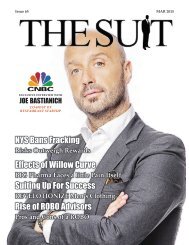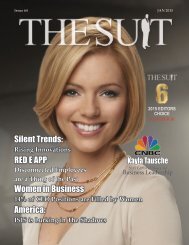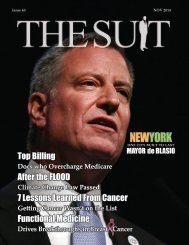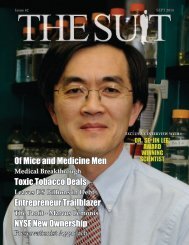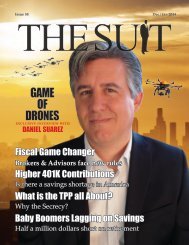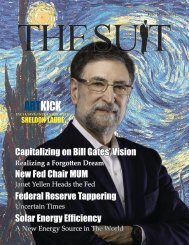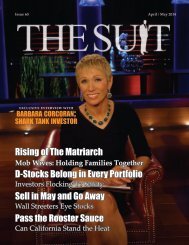o_19grqq7snim9mn019q11f7ds26a.pdf
Marcus Lemonis, a serial entrepreneur and host of the show “The Profit” on CNBC, is a true survivor in the corporate world. The native-born Lebanese business man endured the chaos of a civil war in Beirut and eventually moved to Miami. Lemonis was exposed to the automotive industry throughout his upbringing - his grandfather owning two of the largest Chevrolet dealerships in the United States and Lee Iacocca serving as the family friend and later mentor to Lemonis. On page 12, we conducted an interview with “Profit” host Marcus Lemonis, who offers struggling small businesses capital investment and his expertise in exchange for an ownership stake in the company. In the latter part of the magazine, we interviewed countless wealth advisors during these tough economic times. We recognize that some of the changes in 2013 and 2014 require relevance for financial planners. Therefore, the financial industry continues to push for more realistic standards and reforms.
Marcus Lemonis, a serial entrepreneur and host of the show “The Profit” on CNBC, is a true survivor in the corporate world. The native-born Lebanese business man endured the chaos of a civil war in Beirut and eventually moved to Miami. Lemonis was exposed to the automotive industry throughout his upbringing - his grandfather owning two of the largest Chevrolet dealerships in the United States and Lee Iacocca serving as the family friend and later mentor to Lemonis. On page 12, we conducted an interview with “Profit” host Marcus Lemonis, who offers struggling small businesses capital investment and his expertise in exchange for an ownership stake in the company. In the latter part of the magazine, we interviewed countless wealth advisors during these tough economic times. We recognize that some of the changes in 2013 and 2014 require relevance for financial planners. Therefore, the financial industry continues to push for more realistic standards and reforms.
Create successful ePaper yourself
Turn your PDF publications into a flip-book with our unique Google optimized e-Paper software.
y david stein<br />
>>><br />
Lease – Don’t Own<br />
An Arizona firm specializes in sale-leaseback options as the nation’s economy continues<br />
its steady but slow and tepid recovery from the Great Recession of 2008<br />
and 2009, and many business and franchise owners are in the delicate position<br />
of wanting to expand operations – which generally implies the acquisition of real<br />
estate. Such owners are still extremely cognizant that cash flows move far too<br />
quickly from black to red when major outlays like real estate occur. The commitment<br />
to property purchases can liken itself to a stifled cash flow as monetary assets<br />
become locked down in brick and mortar.<br />
It’s a catch-22 that in many cases<br />
is resolved through the use of a<br />
sale-leaseback transaction, explains<br />
Christopher H. Volk, president and<br />
CEO of STORE Capital, based in Scottsdale,<br />
Arizona.<br />
“The companies we serve are all real<br />
estate intensive,” Volk said. “They<br />
have to have a business location where<br />
their clients come to access their services.<br />
Yet, to increase their profitability<br />
and maintain cash flow, they often<br />
times are better off not owning their<br />
locations.”<br />
This is where Volk’s firm enters the<br />
picture.<br />
STORE is an acronym for “Single<br />
Tenant Operational Real Estate.” The<br />
firm’s purpose is to become the landlord<br />
of choice for a wide variety of real<br />
estate intensive business entities such<br />
as specialty medical operations, fitness<br />
centers, theatres, restaurants and<br />
for-profit education centers, which<br />
Volk indicated these service industries<br />
represent approximately 70 percent of<br />
the firm’s clientele. Retail clientele like<br />
“furniture and sporting goods stores<br />
make up 20 percent of STORE’s portfolio,”<br />
he detailed, “with the remaining<br />
ten percent being industrial facilities<br />
dedicated to either manufacturing or<br />
distribution.” STORE specializes in<br />
purchasing real estate assets and then<br />
leasing those back – in most cases to<br />
the former owner who wishes to continue<br />
conducting business at that site.<br />
“We lower their cost of capital and<br />
this makes them – their cash flow, their<br />
profitability, their ability to expand<br />
operations – better without the real estate<br />
overhead,” Volk explains.<br />
While his firm is essentially a glorified<br />
version of a landlord, he does not<br />
view his work as such. Volk sees and<br />
seeks a partnership with the firm’s clients,<br />
from whom real estate has been<br />
purchased and leased back. Their success<br />
is his success. He said that his goal<br />
is to meet the physical facility needs<br />
of STORE’s clients so effectively, that<br />
these business owners come back to<br />
his firm with repeat business when<br />
new facilities are called for in<br />
their business plans.<br />
“We want to serve them<br />
over and over again,” Volk<br />
said, recognizing that his<br />
approach most likely varies<br />
from other executives<br />
in the sale-leaseback field.<br />
“Historically, most players<br />
in this industry think of<br />
themselves solely as sources<br />
of real estate capital because<br />
they tend to focus a lot of<br />
their effort on the individual<br />
real estate locations. But we<br />
at STORE are not looking just<br />
to buy an asset from a client.<br />
We want to provide a solution<br />
to them, adding a lot<br />
of value and helping them<br />
create wealth instead<br />
of just doing a transaction.”<br />
“It’s almost as if the<br />
real estate itself is incidental<br />
to the business,” he mused. Certainly<br />
it is an important component,<br />
but the basis of Volk’s day-to-day interaction<br />
with clients is aimed at building<br />
relationships that leave business<br />
owners with an understanding of how<br />
his firm’s work can cut their operating<br />
costs and provide attractive financing<br />
options when traditional banks often<br />
cannot.<br />
Such is the case in today’s post-Great<br />
Recession era of increasingly regulated<br />
lending. “The perhaps unintended<br />
effect of the fed-<br />
THE SUIT MAGAZINE - JULY 2014




